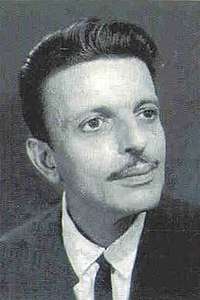René Marqués
René Marqués (October 4, 1919 – March 22, 1979) was a Puerto Rican short story writer and playwright.
René Marqués | |
|---|---|
 René Marqués | |
| Born | October 4, 1919 Arecibo, Puerto Rico |
| Died | March 22, 1979 (aged 59) San Juan, Puerto Rico |
| Occupation | Writer, playwright |
| Genre | Theatre, novels |
| Literary movement | Generación de los 50 |
| Notable works | La Carreta |
| Part of a series on the |
| Puerto Rican Nationalist Party |
|---|
 Flag of the Puerto Rican Nationalist Party |
|
Events and revolts |
|
Nationalist leaders
|
|
Notable nationalists
|
Early years
Marqués was born, raised and educated in the city of Arecibo. He developed an interest in writing at a young age and was politically keen to support independence for the non-sovereign nation of Puerto Rico.[1][2]
In the 1940s, Marqués wrote what is considered to be his best play, La Carreta (The Oxcart). In 1953, it opened in New York City.[3] In 1954, it opened in San Juan and helped secure his reputation as a leading literary figure. The drama traces a rural Puerto Rican family as it moved to the slums of San Juan and then to New York in search of a better life, only to be disillusioned and to long for their island.[1]
The Generation of the 50s
René Marqués was a figure of what was known in Puerto Rico as "La generación del 50" (The Generation of the 50s). This was an artistic and literary group of Puerto Rican intellectuals which included Francisco Matos Paoli, Francisco Arriví, Abelardo Díaz Alfaro and Lorenzo Homar.[4] In 1950, together with the other members of the group, Marqués worked for the Division of Community Education of Puerto Rico. Marqués however, did often come into conflict with Luis Muñoz Marín. He believed in complete Puerto Rican sovereignty and he often criticized Muñoz Marín, when he became governor, because of his acceptance of U.S. sovereignty over Puerto Rico.[2]
In 1954, Puerto Rican director, Roberto Rodríguez, produced La Carreta, the play opened at the Church of San Sebastian, located in Manhattan, New York. The success of the play motivated Míriam Colón and Rodríguez to form the first Latino theater group with its own 60 seat theater, called "El Círculo Dramatico" (The Dramatic Circle).[1][2]
In 1955, Marqués wrote one of his later works, Juan Bobo y la Señora Occidental (Juan Bobo and the Occidental Lady).[5]
In 1959, Marqués published three plays together in the collection Teatro (Theater). These were La Muerte no entrará en Palacio (Death will not enter the Palace), Un Niño Azul para esa Sombra (A Blue Boy for that Shadow) and Los Soles Truncos. In an essay (1960), which the Puerto Rican Nationalist Party published as a pamphlet, Marqués addressed the problem of the language of instruction in Puerto Rico's colonial situation. He concluded that only the enjoyment of complete national sovereignty will cleanse the pedagogical problem of all extra-pedagogical baggage.[1]
Later years
In 1965, George Edgar and Stella Holt produced the English version of Marqués' "The Oxcart" Off-Broadway, with Míriam Colón in the lead role.[2]
René Marqués died in San Juan, Puerto Rico on March 22, 1979 at age 59. Puerto Rico has named a school in his honor and in the Luis A. Ferré Performing Arts Center in San Juan there is a 760-seat René Marqués Theater.[2]
Noted works
Plays
Juan Bobo and the Occidental Lady
La Carreta (The Oxcart)
El Hombre y Sus Sueños (Published in 1948)
El Hombre Y Sus Sueños
Palm Sunday
El Sol y Los Mac Donald (Premiered 1950)
Los Soles Truncos (Premiered 1958) (Based on his short story "Purificación en la Calle del Cristo")
Un Niño Azul para esa Sombra
La Muerte No Entrará en Palacio
La Casa Sin Reloj
El Apartamiento
Mariana o el Alba
Sacrificio en el Monte Moriah
David y Jonatán, Tito y Berenice
Carnaval Afuera, Carnaval Adentro
Novels
La Víspera del Hombre
La Mirada (1975)
Essays
El Puertorriqueño Dócil
Ensayos 1956–1969
Short Stories
Otro Día Nuestro
En Una Ciudad Llamada San Juan
Purificación en la Calle del Cristo
Cuentos Puertorriqueños de Hoy
Screenplays
Juan Sin Seso (Brainless Juan) (Short Film; Dir. Luis A. Maisonet)
Modesta (Short Film; Dir. Benji Doniger, Music by Héctor Campos Parsi)
See also
- List of Puerto Ricans
- French immigration to Puerto Rico
- List of Puerto Rican writers
- Puerto Rican literature
- Puerto Rican Nationalist Party
References
- Dictionary of Literary Biography on Rene Marques
- La Muerte no entra en un Palacio
- Gil de La Madrid, Antonio. "René Marqués, dramaturgo". Biografías de escritores puertorriqueños, La Gran Enciclopedia Ilustrada del Proyecto Salón Hogar. Accessed February 20, 2013.
- La generación del 50
- Encyclopedia of Latin American Theater, p. 431; ed. by Eladio Cortés & Mirta Barrea-Marlys; Greenwood Publishing Group pub.; Westport, CT; ISBN 0-313-29041-5